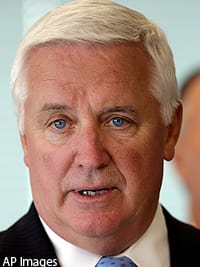Corbett says NCAA violated own bylaws

Five months into unprecedented sanctions levied against Penn State by the NCAA, Pennsylvania governor Tom Corbett says he is fighting back on behalf of the citizens of the commonwealth.
Wednesday morning in front of a packed banquet room at the Nittany Lion Inn on Penn State's campus, Corbett revealed his plans for a lawsuit filed against the NCAA for violating antitrust laws in its handling of sanctions against the university in the summer.
Advertisement
"We should stand up and fight for those who have been punished unfairly by the NCAA," Corbett said. "After months of research and deliberation, we have concluded that the NCAA sanctions were overreaching and unlawful. We will file antitrust on behalf of Penn State asking the NCAA to throw out all of the sanctions against Penn State."
Though the details offered a complicated portrait of the claims that the NCAA violated its own bylaws, and an even more complicated claim that citizens of Pennsylvania were being adversely affected by those violations, Corbett laid his basis for the claim that will be "further fleshed out" in the full report expected to be released later Wednesday.
"Why would the NCAA involve itself in something that was already being handled by the courts?" Corbett asked. "Why would it punish the citizens of Pennsylvania?
"The only logical conclusion is that the NCAA did it because they benefitted from the penalties."
Corbett continued, explaining that the unilateral actions of NCAA president Mark Emmert and a handful of top NCAA officials, forcing Penn State president Rodney Erickson to accept the sanctions without protest or face the death penalty for the football program, were unlawful.
That act, disregarding the own bylaws of the NCAA, violated antitrust laws, and hurt not only past, current and future Penn State football players, but all university students, faculty, administration, community members and citizens throughout the state, he said.
"Just as it applies their rules to member schools and athletes, so too should the NCAA abide by their own rules," he said. "The NCAA's leadership can't make up their own rules.
"I'm here for one reason. I believe this to be the right thing to do on behalf of the students who have gone through this institution, who are here now and will be here in the future. That's why we're doing this. It is not a political case."
Notes:
- Following Corbett's question and answer session, general counsel Jim Schultz took questions himself, including one further expounding on the general principles of the lawsuit.
"The NCAA is a trade association, you have a number of members, one of which is Penn State. In this case, the NCAA has an infractions committee and process you must go through. There's a process. In fact, the NCAA didn't use that process at all. Instead, a small group of folks went alone on this one, and that's prohibited by the bylaws. Trade associations have an obligation to abide by antitrust laws. That didn't happen here. They went outside the rules and attacked Penn State to the detriment to the entire market.
- Multiple former Penn State football players, including Football Letterman's Club president Tim Sweeney, along with Kenny Jackson, Tim Freeman, Trey Bauer and Justin Kurpeikis were all present at the announcement.
- Corbett was asked whether or not the lawsuit was a rebuttal of the Freeh Report.
"The Freeh Report is an incomplete report," he said. "It was never adopted by the Board of Trustees and it was incomplete."
- Asked about the timing of the lawsuit, Corbett explained that he did not want to make the same rush to judgment that the NCAA did in levying the sanctions in the first place. He also noted that he didn't want to do it during the football season.